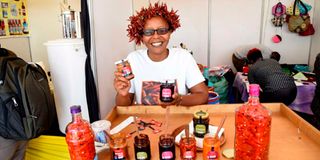Do you like it hot or sweet? The making of a chili business

Mdalasini Relishes founder Lokko Matheka displays her range of chili products during the third edition of the SMEs Conference and Expo held at the KICC courtyard.
What you need to know:
- Lokko Matheka had no intention of going into this business until her mother encouraged her to do so.
- She sources produce from farmers from the arid regions of the neighbouring Makueni County.
Wearing a crown made of dry chilies, Lokko Matheka stood out among the exhibitors at this year’s SMEs Conference and Expo organised by the Nation Media Group.
But it is the samples of assorted condiments packed in glass jars she offered those that visited her stand that drew a crowd.
“This is her hotness, the queen of chilies," she jokingly introduced herself.
“Nyege SOS is one of my most popular chilies, yet it is not the hottest,” she told a curious man who bought two jars once he sampled the contents.
“The name is inspired by the Nyege Nyege Music Festival, a popular cultural festival in Uganda, the name alluding to an irresistible urge to dance. Sometime before the outbreak of Covid-19, the organisers of the festival asked us to make them a bespoke product after they sampled and liked our ingenuity,” she explains, hence the Nyege SOS.
Trading as Mdalasini Relishes, Lokko has turned her childhood hobby, cooking, into a thriving business. She manufactures and markets assorted chili-based condiments which include chili sauces, jams and relishes, a hot cake among lovers of flavoured food, at a workshop located in her home at Katelembu region on the outskirts of Machakos Town.
She grows chilies all year round in an irrigated portion of the farm. Over and above the chilies she grows herself, she has contracted dozens of farmers who mainly come from the arid regions of the neighbouring Makueni County.

Lokko Matheka, (right) offers samples of her chili to visitors at her stand during the third edition of the SMEs Conference and Expo held at the KICC courtyard.
She supplies the farmers with seeds “so that they grow exactly what I want and then I buy the mature produce from them”.
Although the hotness of chilies is largely determined by the type, Lokko explains that exposing them to many hours of sunlight adds value to them. The chilies are dried under direct sun, and then crushed using a blender after harvesting.
“We cook some of them and blend others. To come up with some of our products, we blend some of the chilies with garlic, onion, sunflower seeds, and mulberry. Essentially, our business is hinged on adding value to chilies through preservation. Fresh chilies go bad very quickly, but when you dry and store them in a jar, they last for as long as you want. Cooking is also part of the preservation methods we have adopted.”
A hotelier who has worked in various high-end hotels in the country, Lokko credits her business to her mother.
“My brother and I have been cooking all our lives as our mother supervised. He had an interest in baking while I had an interest in the flavouring stuff. Sometime back, my mother got sick, to manage her illness, doctors advised us to switch to organic l foods. We also learned that chilies are organic pesticides when you soak them in a mixture of garlic, onions and water overnight, and then spray the solution on the crops. This caused a mushrooming of chilies in our farm,” she explained.
Her mother advised them to find a way of preserving the chilies, hence the birth of her.
“After trying out different recipes and testing what works and what is popular in the market, I eventually found a way of preserving and packaging the chilies.”

Mdalasini Relishes founder Lokko Matheka. She was among the exhibitors during the third edition of the SMEs Conference and Expo held at the KICC courtyard.
Making a sizzling condiment is Lokko’s biggest source of inspiration. The mother of two also takes pride in the fact that the business is environmentally friendly. Instead of using plastics which are expensive and harmful to the environment, she uses glass jars to package her products. Her face lights up when she explains the various types of chilies she produces.
“The size of the seed indicates the hotness of chilies. The smaller the size, the hotter the chilies,” she says, pointing out that all the chilies in their line have an exclusive name.
For instance, there is Teargas, named after the first product the company made, using cayenne pepper. There is also have Dynamite, Shrapnel, and OXYMORON, which is a hot and sweet barbeque sauce,” she said.
She mainly markets her produce through social media. In addition, she attends expos and flea markets. She is also a member of the organic farmers’ market which organises markets in Nairobi’s upper market areas during the weekends, even though individual buyers are her main customers.
Besides braving stiff competition from established brands, her biggest challenge is access to capital to expand the business. She also chokes under the myriad of licenses required to operate the business.
“Although working from home is draining as you have to balance business responsibilities and office work, it is fulfilling in that my children get to see and appreciate what happens in the entrepreneurship world. One of the biggest lessons I have learned is that resilience is important for entrepreneurs, but you have to also know when to quit.”
With time, she plans to expand her product line to include natural beauty products.





